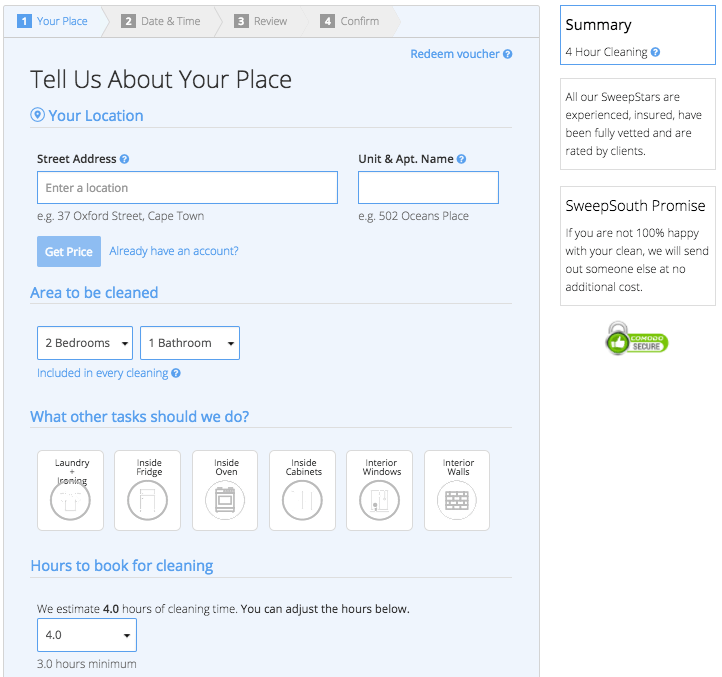SweepSouth: The Uber for domestic cleaning

In a market where households make frequent use of domestic cleaning services, SweepSouth has simplified the process of identifying reliable domestic workers. While the story has been positive thus far, can this business model scale?
SweepSouth is a Cape Town-based on-demand platform for domestic cleaning services. Having realised strong metrics since launching in 2014, it was selected to join the 2015 cohort of 500 Startups. Since then, the company has raised a ZAR 10mn (~USD700,000) Series A and continued to demonstrate strong growth in South Africa. But is its model sustainable?
- Domestic workers apply to register on the SweepSouth platform. They undergo background checks and those approved are insured and listed on the platform.
- Households make a booking via the SweepSouth app or website by specifying their location, the size of their home, cleaning services required and desired date for the service. A minimum lead time of 24 hours is required.
- The platform algorithm estimates how long the cleaning will take (3-hour minimum) and provides a quote.
- If the quote is accepted, the household is given the option to select one of 10 SweepStar matches whose profiles include a picture, rating and short bio.
- The booking is confirmed when the SweepStar accepts typically within a few minutes
- After the cleaning, payment is processed and both SweepStar and households rate each other on a five-star scale.
- If households are not 100% satisfied, SweepSouth sends out another SweepStar at no additional cost.
Value Creation
For the household, the process of finding help is significantly simplified. Rather than having to scour classified ads for agencies that deliver questionable quality, or rely on referrals from friends, households can directly make bookings with vetted SweepStars. Further, this process can be completed in a few minutes rather than the days or weeks it would otherwise take to identify, interview and supervise reliable and trustworthy cleaners.
For the SweepStars, who are typically un- or underemployed low-skilled women, SweepSouth provides employment coupled with transparency and certainty around compensation. While there is a published minimum wage for domestic workers, because they are informally employed, their employers do not always adhere to this. SweepSouth addresses this challenge by enabling SweepStars to earn a living wage.
Value Capture
SweepStar takes a commission of ~20% on each booking and charges a R25 service fee for one-time bookings. The service fee is waived when customers make a recurring booking, e.g. weekly, monthly, etc.
Considerations for Scaling
In its first few months, SweepSouth experienced month-on-month growth rates of ~50%. In a market where the culture is well-suited to high frequency and long-term use of domestic cleaning services, the company has also seen 80% of customers being recurring clients. But can they sustain this?
While there is no direct Lyft to SouthSweep’s Uber, the fact that 30% of SweepStars work in other homes outside of the platform, indicates that the SweepStars themselves could be the platform’s biggest competitor. Given how difficult it has been for households and cleaners to connect, there is a real risk of disintermediation with platform users from both sides leveraging SweepSouth as an initial screen and subsequently taking their relationships offline. This would be mutually beneficial to the cleaners, who would no longer forgo the 20% commission, as well as the households, as they would benefit from increased efficiency and trust by having the same cleaner.
Inherently, the platform has cross-side network effects that could deliver some benefit in driving stickiness and preventing disintermediation. However, these network effects are extremely localised due to the limited catchment area that a domestic worker can serve without having to incur high transport costs that would significantly erode her earnings. The addition of complementary services such as gardening, pool cleaning, etc. may therefore be an avenue to drive continued engagement. Indeed, the founders have indicated that the technology was built to allow the addition of such new services.
It’s been a positive story for SweepSouth thus far but it remains to be seen whether they can surmount these hurdles to succeed in the long run.
Sources



